

01 Erklärvideo mit VideoScribe: Sparkol Anleitung Deutsch. All_revisions_final.PDF - dissertation.pdf. Examining the reuse of open textbooks. John Hilton III and David A. Wiley Brigham Young University, USA Neil Lutz Rutgers University, USA Abstract An important element of open educational resources (OER) is the permission to use the materials in new ways, including revising and remixing them. Prior research has shown that the revision and remix rates for OER are relatively low. Keywords: Open educational resources; remix; reuse; open textbooks; electronic textbooks; Flat World Knowledge; open access Only a decade ago textbooks existed as a physical resource. One way to further increase the accessibility of the digital textbook is to make it an open educational resource (OER). The Access Compromise and the 5th R. It’s been seven years since I introduced the 4Rs framework for thinking about the bundle of permissions that define an open educational resource, or OER.
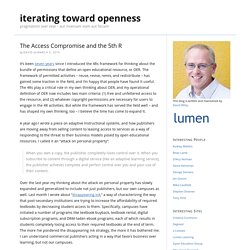
The framework of permitted activities – reuse, revise, remix, and redistribute – has gained some traction in the field, and I’m happy that people have found it useful. The 4Rs play a critical role in my own thinking about OER, and my operational definition of OER now includes two main criteria: (1) free and unfettered access to the resource, and (2) whatever copyright permissions are necessary for users to engage in the 4R activities.
But while the framework has served the field well – and has shaped my own thinking, too – I believe the time has come to expand it. A year ago I wrote a piece on adaptive instructional systems, and how publishers are moving away from selling content to leasing access to services as a way of responding to the threat to their business models posed by open educational resources. The Access Compromise. Passive MOOC Students Don’t Retain New Knowledge, Study Finds. Students in massive open online courses are apt to take a passive approach to learning, avoiding collaboration with others, seeking only passing grades, and therefore not retaining new knowledge, a new study has found.
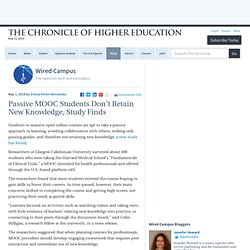
Researchers at Glasgow Caledonian University surveyed about 400 students who were taking the Harvard Medical School’s “Fundamentals of Clinical Trials,” a MOOC intended for health professionals and offered through the U.S. Virtual Canuck. Elitesoziologie - Prof. Dr. Michael Hartmannn im Interview (TU Darmstadt) Pierre-bourdieu-ici-dans-sa-maison-de-lasseube-en-1992_881976_490x290.jpg (JPEG-Grafik, 490 × 290 Pixel)
Video: Saskia Sassen, Introduction des sessions du Lift 2011 +An interview about "Smart cities" V#9: Allgemeine Sozialtheorie V.: Pierre Bourdieu (Hubert Knoblauch) Soziologie ist Selbstverteidigung. “I often say sociology is a martial art, a means of self-defense. Basically, you use it to defend yourself, without having the right to use if for unfair attacks.” Recent Papers. FAMOUS SOCIOLOGISTS. © 1996-2014 AByT!
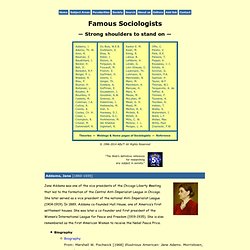
All Rights Reserved Jane Addams was one of the vice presidents of the Chicago Liberty Meeting that led to the formation of the Central Anti-Imperialist League in Chicago. She later served as a vice president of the national Anti-Imperialist League (1904-1919). In 1889, Addams co-founded Hull House, one of America’s first settlement houses. She was later a co-founder and first president of the Women’s International League for Peace and Freedom (1919-1935). - Bordieu_Seminar_Berger_WiSe_0809.pdf. In trockenen Büchern. Bourdieus Analyse des kulturellen Konsums und des Kunstgeschmacks ist trotz der hohen Anforderungen, die sie an den Leser stellt, für alle von Interesse, die geneigt sind, ihre eigenen, meist als selbstverständlich aufgefassten kulturellen Vorlieben und Praktiken zu prüfen.
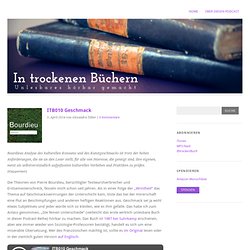
Bourdieu Youtube Videos - Save, Download & Watch. 032: Bourdieu und der Fluch der sozialen Ungleichheit « SozioPod. Soziopod #032: Bourdieu und der Fluch der sozialen Ungleichheit.
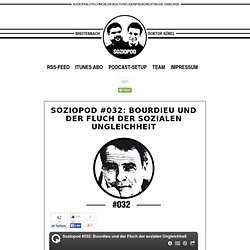
MOOCs: Charles Severance at TEDxKalamazoo. Flipped-learning skepticism: can students really learn on their own? We’re currently looking at points of skepticism about flipped learning and the flipped classroom.
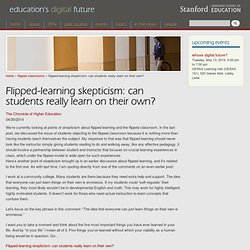
In the last post, we discussed the issue of students objecting to the flipped classroom because it is nothing more than having students teach themselves the subject. My response to that was that flipped learning should never look like the instructor simply giving students reading to do and walking away; like any effective pedagogy, it should involve a partnership between student and instructor that focuses on crucial learning experiences in class, which under the flipped model is wide open for such experiences.
Passive MOOC students don’t retain new knowledge, study finds. Students in massive open online courses are apt to take a passive approach to learning, avoiding collaboration with others, seeking only passing grades, and therefore not retaining new knowledge, a new study has found.
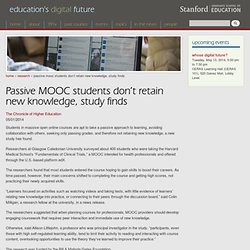
Researchers at Glasgow Caledonian University surveyed about 400 students who were taking the Harvard Medical School’s “Fundamentals of Clinical Trials,” a MOOC intended for health professionals and offered through the U.S. -based platform edX. Connectivism: A Learning Theory for the Digital Age. Connectivism: A Learning Theory for the Digital Age December 12, 2004 George Siemens Update (April 5, 2005): I've added a website to explore this concept at www.connectivism.ca Introduction.
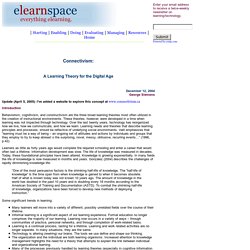
Openness is still the only superpower. Flurry of anti-MOOC, anti-Cousera columns in the Chronicle recently, many fairly well thought out.
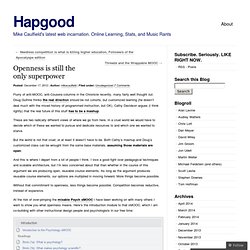
Doug Guthrie thinks the real direction should be not cohorts, but customized learning (he doesn’t deal much with the mixed history of programmed instruction, but OK). Cathy Davidson argues (I think rightly) that the real future of this stuff has to be a mashup. Soziale Netzwerke im Diskurs — IfBM - Institut für Bildungswissenschaft und Medienforschung. Beiträge zur Bewertung und Einordnung eines neuen Phänomens Sowohl innerhalb des wissenschaftlichen als auch des gesellschaftlichen Diskurses nehmen Soziale Netzwerke einen großen Raum ein.
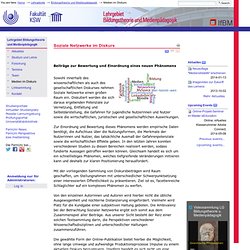
Diskutiert werden die sich daraus ergebenden Potenziale zur Vernetzung, Entfaltung und Selbstdarstellung, die Gefahren für jugendliche Nutzerinnen und Nutzer sowie die wirtschaftlichen, juristischen und gesellschaftlichen Auswirkungen. Zur Einordnung und Bewertung dieses Phänomens werden empirische Daten benötigt, die Aufschluss über die Nutzungsformen, die Merkmale der Nutzerinnen und Nutzer, das tatsächliche Ausmaß der Gefahrenpotenziale sowie die wirtschaftlichen Effekte geben. Kategorie: wissens.blitze. Initiative Lernen in der digitalen Gesellschaft – CoLab. Soziale Bewegungen und Social Media. Learn and talk about Pierre Bourdieu, 20th-century French philosophers, Anti-globalization writers, Burials at Père Lachaise Cemetery, Collège de France faculty. Pierre Bourdieu (French: [buʁdjø]; 1 August 1930 – 23 January 2002) was a French sociologist, anthropologist,[2] and philosopher.[3] Bourdieu's best known book is Distinction: A Social Critique of the Judgment of Taste (1979).
The book was judged the sixth most important sociological work of the twentieth century by the International Sociological Association. Learn and talk about Pierre Bourdieu, 20th-century French philosophers, Anti-globalization writers, Burials at Père Lachaise Cemetery, Collège de France faculty. Pierre Bourdieu (French: [buʁdjø]; 1 August 1930 – 23 January 2002) was a French sociologist, anthropologist,[2] and philosopher.[3] Bourdieu's best known book is Distinction: A Social Critique of the Judgment of Taste (1979). The book was judged the sixth most important sociological work of the twentieth century by the International Sociological Association. Bourdieu and Public Sociology: BSA Bourdieu Study Group Event. The BSA Bourdieu Study Group held its first study group event on 8th June 2012 since it officially established itself in January 2012. This event drew together Bourdieuian scholars for a debate around issues relating to public engagement and Bourdieu’s legacy.
It posed such questions as: should the sociologist be helping people to reflect and question their own lives and conditions, why do we do sociology, and was Bourdieu really a public sociologist? In Bourdieu’s later years he asserted that sociologists cannot be neutral and advocated helping the public develop a reflexive mode of relating to the world. During the 1990s he became more deeply involved in political debate and a critic of neoliberalism. In 1993 The Weight of the World – which became a bestseller in France – was published. Department of Sociology, University of California Berkeley. These imaginary conversations with Pierre Bourdieu began as notes for Loïc Wacquant’s boot camp course on the enormous scholarly and political corpus of Bourdieu, a course I took in 2005. Listening to Wacquant’s conversation with Bourdieu, I became curious about other conversations, specifically the repressed ones between Bourdieu and Marxism, conversations concerning conceptions of society and its social transformation as well as the meaning of science and the place of intellectuals.
Pierre bourdieu.